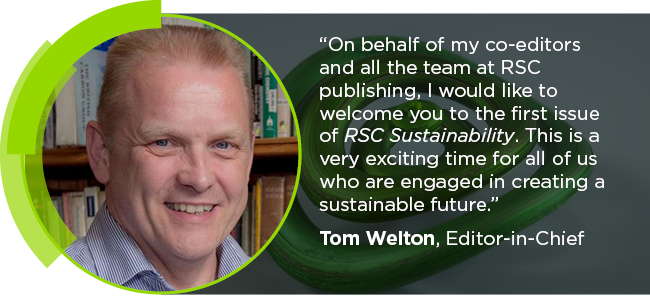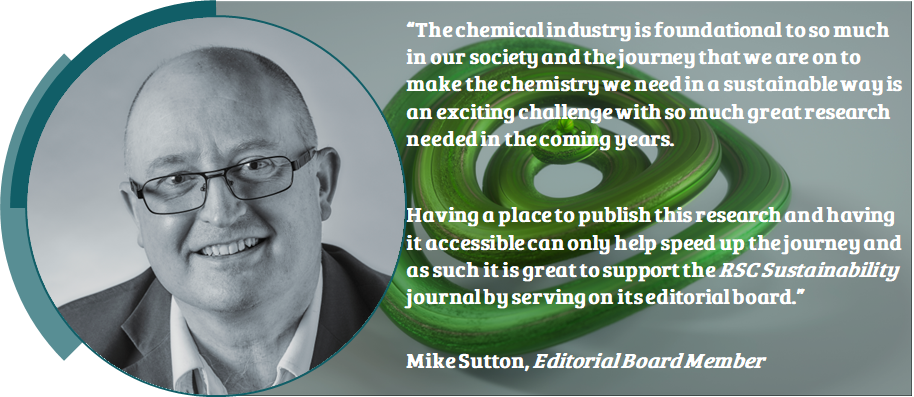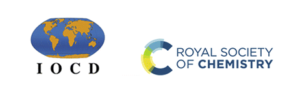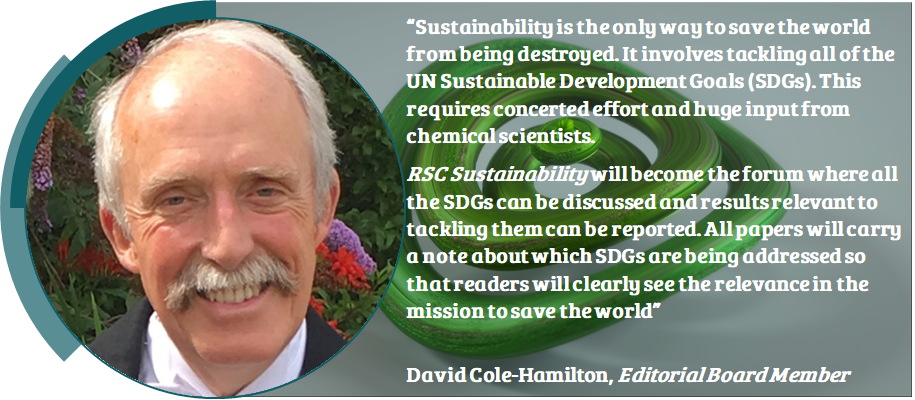Read the first-ever issue of our gold open access journal
Our first issue is packed with full papers, communications, tutorial reviews and perspectives within the realm of sustainability and a better future. Plus, you can discover an editorial from our editor-in-chief, Tom Welton. Explore the full issue here.

Some of the articles included…
Introducing RSC Sustainability
Tom Welton
RSC Sustain. 2023, 1, 8-9, DOI: 10.1039/D2SU90001G
Global essay competition: Young Voices in the Chemical Sciences for Sustainability
RSC Sustain. 2023, 1, 10, DOI: 10.1039/D2SU90002E
From rocks to bioactive compounds: a journal through the global P(V) organophosphorus industry and its sustainability
Sosthène P M Ung, Chao-Jun Li
RSC Sustain. 2023, 1, 11-37, DOI: 10.1039/D2SU00015F
Sustainability applications of rare earth elements from metallurgy, magnetism, catalysis, luminescence to future electrochemical pseudocapacitance energy storage
Shan-Shan Chai, Wei-Bin Zhang, Jin-Lei Yang, Lun Zhang, Myat Myintzu Theint, Xian-Li Zhang, Shao-Bo Guo, Xia Zhou, Xue-Jing Ma
RSC Sustain. 2023, 1, 38-71, DOI: 10.1039/D2SU00054G
Surfactant-free synthesis of metal and metal oxide nanoparticles: a perspective
Siavash Iravani
RSC Sustain. 2023, 1, 72-82, DOI: 10.1039/D2SU00088A
Recycling post-consumer PLA into acrylic acid or lactide using phosphonium ionic liquids
Kwinten Janssens, Wouter Stuyck, Kirsten Stiers, Jens Wéry, Mario Smit, Dirk E de Vos
RSC Sustain. 2023, 1, 83-89, DOI: 10.1039/D2SU00078D
Phosphate-induced enhancement of fumarate production from a CO2 and pyruvate with the system of malate dehydrogenase and fumarase
Mika Takeuchi, Yutaka Amao
RSC Sustain. 2023, 1, 90-96, DOI: 10.1039/D2SU00031H
Birch fractionation in γ-valerolactone with the emphasis on pulp properties: prehydrolysis, acid-catalyzed, and alkaline-catalyzed concept
Marianna Granatier, Huy Quang Lê, Eva Carmona González, Herbert Sixta
RSC Sustain. 2023, 1, 97-106, DOI: 10.1039/D2SU00046F
Tailoring lixiviant properties to optimise selectivity in E-waste recycling
Jennifer M Hartley, Sean Scott, Rodolfo Marin Rivera, Phil Hunt, Anthony J Lucio, Philip Bird, Robert Harris, Gawen R T Jenkin, Andrew P Abbott
RSC Sustain. 2023, 1, 107-116, DOI: 10.1039/D2SU00038E
Biologically bound nickel accelerated depolymerization of polyethylene to high value hydrocarbons and hydrogen
Parul Johar, Elizabeth L Rylott, C Robert McElroy, Avtar S Matharu, James H Clark
RSC Sustain. 2023, 1, 117-127, DOI: 10.1039/D2SU00001F
Novel polymeric cobalt tetrabenzimidazole phthalocyanine for nanomolar detection of hydrogen peroxide
Keshavananda Prabhu C P, Kenkera Rayappa Naveen, Shambhulinga Aralekallu, Shivalingayya, Lokesh Koodlur Sannegowda
RSC Sustain. 2023, 1, 128-138, DOI: 10.1039/D2SU00035K
Tailoring the antibacterial and antioxidant properties activities of iron nanoparticles with amino benzoic acid
Shah Faisal, Saima Sadiq, Muhammad Mustafa, Muhammad Hayat Khan, Muhammad Sadiq, Zaffer Iqbal, Maham Khan
RSC Sustain. 2023, 1, 139-146, DOI: 10.1039/D2SU00044J
Triazaphosphaadamantane-functionalized terpyridine metal complexes: cyclohexane oxidation in homogeneous and carbon-supported catalysis
Ivy L Librando, Anup Paul, Abdallah G Mahmoud, Atash V Gurbanov, Sónia A C Carabineiro, M Fátima C Guedes da Silva, Carlos F G C Geraldes, Armando J L Pombeiro
RSC Sustain. 2023, 1, 147-158, DOI: 10.1039/D2SU00017B
Color stability of blue aluminates obtained from recycling and applied as pigments
Dienifer F L Horsth, Julia de O Primo, Nayara Balaba, Fauze J Anaissi, Carla Bittencourt
RSC Sustain. 2023, 1, 159-166, DOI: 10.1039/D2SU00057A
RSC Sustainability is one of the latest additions to our gold open access journal portfolio. Every article in this issue, and future ones, is free to read and access by anyone. Publish your next paper in RSC Sustainability to be included in one of our issues. We are covering all article processing charges until mid-2025, so until then, you can publish with us for free.
All of our publications contribute to important conversations on sustainability, our planet and the UN’s Sustainable Development Goals. We hope you feel inspired reading these.
Submit your manuscript to RSC Sustainability here!







